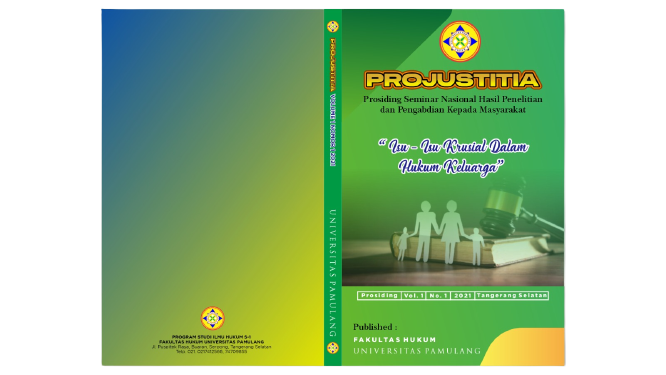TINJAUAN YURIDIS TERHADAP PENYITAAN BARANG LEASING TANPA MELALUI PROSES PENGADILAN (Berdasarkan Putusan Mk Nomor 2/Puu-Xix/2021)
Abstract
ABSTRAK
Penulisan karya ilmiah ini mengkaji mengenai Putusan MK No. 2/PUU-XIX/2021 yang dikeluarkan tertanggal 31 Agustus 2021. Putusan Mahkamah Konstitusi tersebut memberikan penjelasan dan sekaligus memberikan penafsiran ulang mengenai makna Pasal 15 ayat (2) dan (3) Undang-Undang Nomor 42 Tahun 1999 tentang Jaminan Fidusia yang telah dimaknai Mahkamah Konstitusi melalui Putusan Mahkamah Konstitusi Nomor 18/PUU-XVII/2019 sebelumnya yang menyatakan bahwa “Sertifikat Jaminan Fidusia sebagaimana dimaksud dalam ayat (1) mempunyai kekuatan eksekutorial yang sama dengan putusan pengadilan yang telah memperoleh kekuatan hukum tetapâ€. Kemudian dalam Putusan Mk No. 2/PUU-XIX/2021 memberikan makna bahwa yang dimaksud dengan "kekuatan eksekutorial" adalah langsung dapat dilaksanakan tanpa melalui pengadilan dan bersifat final serta mengikat para pihak untuk melaksanakan putusan tersebut. Berdasarkan penelitian ini maka dapat disimpulkan bahwa Putusan Mahkamah Konstitusi tersebut dianggap tidak memberikan keadilan dan perlindungan bagi pihak kreditur. Tetapi faktanya putusan Mahkamah Konstitusi tersebut justru memberikan perlindungan hukum kepada pihak-pihak yang terkait dalam perjanjian fidusia. Adanya pelaksanaan eksekusi sertifikat jaminan fidusia melalui pengadilan negeri sesungguhnya hanyalah sebagai sebuah alternatif yang dapat dilakukan dalam hal tidak ada kesepakatan antara kreditur dan debitur. Sedangkan terhadap debitur yang telah mengakui adanya wanprestasi dan secara sukarela menyerahkan objek jaminan fidusia, maka eksekusi jaminan fidusia dapat dilakukan oleh kreditur atau bahkan debitur itu sendiri.
Kata Kunci : Eksekusi Jaminan fidusia tanpa proses pengadilan negeri.
ABSTRACT
The writing of this scientific paper examines the Constitutional Court Decision No. 2/PUU-XIX/2021 issued on August 31, 2021. The Constitutional Court's decision provides an explanation and at the same time provides an evaluation of the meaning of Article 15 paragraphs (2) and (3) of Law Number 42 of 1999 concerning Fiduciary Guarantees which have been interpreted by the Court The Constitution through the previous Constitutional Court Decision Number 18/PUU-XVII/2019 which stated that "The Fiduciary Guarantee Certificate as referred to in paragraph (1) has the same executive power as court decisions that have permanent legal force". Then in the Constitutional Court Decision No. 2/PUU-XIX/2021 means that what is meant by "executory power" is that it can be directly exercised without trial and is final and binding on the parties to implement the decision. Based on this research, it can be said that the Constitutional Court's decision is considered not to provide justice and protection for creditors. But in fact the decision of the Constitutional Court actually provides legal protection to the parties involved in the fiduciary agreement. The execution of the fiduciary guarantee through the district court is actually only an alternative that can be done in the event that there is no agreement between the creditor and the debtor. Meanwhile, for debtors who have acknowledged default and voluntarily surrendered the object of a fiduciary guarantee, then the execution of the fiduciary guarantee can be carried out by the creditor or even the debtor himself.
Keywords: Execution of fiduciary guarantee without a district court process.


